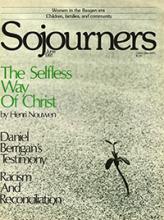The Miami riots last summer, the recent rallies of the Ku Klux Klan, the murders in Atlanta, my work at Grady Hospital in that city, and a recent visit to my childhood physician's office, which continues to be segregated, have brought me face to face with rage in general and with the depth of my own personal rage. While I realize that some of my rage comes from the world not being the way I would like, a great deal of it comes from having to live as a black American.
There are many times when I wonder if we black people would not have been better off if we had stayed in Africa, and perhaps we would have, if we had had a choice. In our history and process of transition, we have lost a large part of our souls.
I am simply not clear about the gain for a people who live in a land which promises life, liberty, and the pursuit of happiness but forgets to mention that the price for these inalienable rights is loss of our souls. Much of the rage that fills the psyches of black Americans comes from the wounds of unkept promises. While a great part of this rage is expressed as justified anger at having no decent places to live, no real jobs, poor educational opportunities, inadequate medical care, and unfair laws, I believe the rage is far deeper than these issues alone.
When Grier and Cobbs wrote their bestselling book Black Rage in the 1960s, all of us sat up and took notice because the smell of the smoke and flames in Watts, Detroit, Newark, and other cities was still in our nostrils. But as the fumes evaporated so did our concern. Our desperate need to go on with business as usual pushed us to do just that. It was as if we had discovered a giant, oozing sore and were worried that it might be cancerous. Therefore we put a Band-Aid on it and refused to see a doctor. Unfortunately, Band-Aids have no power to cure and often provide no assistance at all.
Read the Full Article

